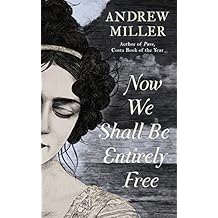
Family Drama
1800s
England / Spain
Andrew Miller
is a Costa award-winning author and this is another piece of literary creation
that some will love, others not so much.
The year is
1809 and John Lacroix is brought back to his family home, a large manor house
in Somerset that is populated by the housekeeper and a dog, more dead than
alive having been severely injured in the retreat from Spain back into
Portugal. Nursed back to life by the housekeeper, the introverted Lacroix
gradually regains his strength but is unsettled, especially when a former army
colleague visits and encourages him to return to the barracks with a view to
returning to Spain. A trip away, far away to the islands of Scotland, is his
plan, to run away from the army and the darkness that lurks in his mind, a
half-formed impression of some terror that he can't face.
Meanwhile, in
Lisbon, Calley, a British soldier who witnessed an atrocity in a small Spanish
village, who also happens to be brutish and somewhat of a thug, is sent to
England with the more dapper Spanish officer, Medina, to track down and kill
the man deemed responsible for the atrocity: Lacroix.
Is Lacroix a
scapegoat for the events in that Spanish village, a random English officer who
will serve his country better by dying for it than fighting for it? Or is the
agonising memory of Spain and the massacre at the village one and the same?
Being literary,
the language of this novel is a delight. The descriptions are vivid and fresh,
nothing hackneyed or over-used here. And the characters are distinct, Lacroix
rather laughs at himself because it is easier than taking himself seriously,
Calley is just the right side of a criminal to suit the British Army, and
Medina has enough gravitas to avoid slipping into some caricature of a Spaniard
adrift in a country where the language and customs often escape him. Indeed,
the plot in its barest form could easily have come from the pen of Bernard Cornwell
(and in some elements, did) with Sharpe the main character searching for a
quiet life but with the war hot on his heels. But that is about where the
similarities end.
For this is
literary, and the setting is secondary to the language and the themes of life and
death, love and war. The characters are delicately drawn, slightly in soft
focus so they are just out of reach, the edges smoothed by the intricate
language so they are not quite real.
The attention
to detail makes this a long read. I read the eBook but the physical book is
over 400 pages, and none of them race away with you. It is not a page turner.
There is tension, but you feel that it will wait for you, there's no urgency.
Yes, we'd like to know how Calley and Medina are going to trace Lacroix beyond
Bristol, but you feel that they are happy to wait for you finish the washing up
before they continue on their journey.
This is
undoubtedly an accomplished novel filled with accurate historical detail and a
plot that works, but it is slow, it is ethereal in places. The war in Spain is
a backdrop, not a living part of the novel, and it could therefore be set in
any similar conflict. The author did not set out to write a novel about the
Peninsula War, but about a man exploring himself after a devastating event. It
works, and it works well, but don't pick it up thinking you've found a
replacement for Richard Sharpe.
© Louise Adam

click here to
return to home page 'Bookshelf' then scroll down for more items of interest

No comments:
Post a Comment
We do not accept comments. If you need to contact Discovering Diamonds go to the CONTACT facility
Note: only a member of this blog may post a comment.